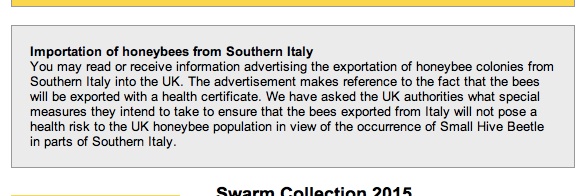Wake up and smell the coffee
The BBKA’s Worker Bee newsletter last week makes a brief reference to the health risks to UK beekeeping associated with importing bees infested with Small Hive Beetle (SHB) …

Worker Bee statement on SHB
… a very brief reference. It’s particularly disappointing that they don’t even take the opportunity to emphasise their opposition to honeybee imports. This newsletter will have been distributed to the recently signed-up trainee beekeepers who have taken courses in the 2014/15 winter. These new beekeepers, quite understandably, want their own bees as soon as possible and may buy imports, perhaps unknowingly.
I have written extensively on the risk posed to beekeepers from the importation of SHB and the damage I think cheap imports do to the quality of UK beekeeping. If you’re a beginner reading this please try and source a local raised nuc, even if it means you have to wait a couple more weeks for bees. Ask the following simple questions:
- do you know where the nuc originated from? Many nucs are exported from Southern Italy to France for subsequent selling-on.
- wouldn’t you prefer bees adapted to the local conditions in your area? You’re also more likely to get advice and support from a local beekeeper you buy a nuc from.
- do you really need bees in late March/early April? It’s often too cold to inspect them properly and a nuc acquired in mid/late May will build up just as well and may even give you honey from the summer nectar flow.
SHB has never been eradicated from any country it has been imported to. Where known, importation has previously occurred with queens, bees or bee-related products and equipment. The National Bee Unit reviewed the most likely route of importation to the UK and reported that – big surprise – it is with queens, bees or bee-related products and equipment.
Buy local bees … please!
Join the discussion ...